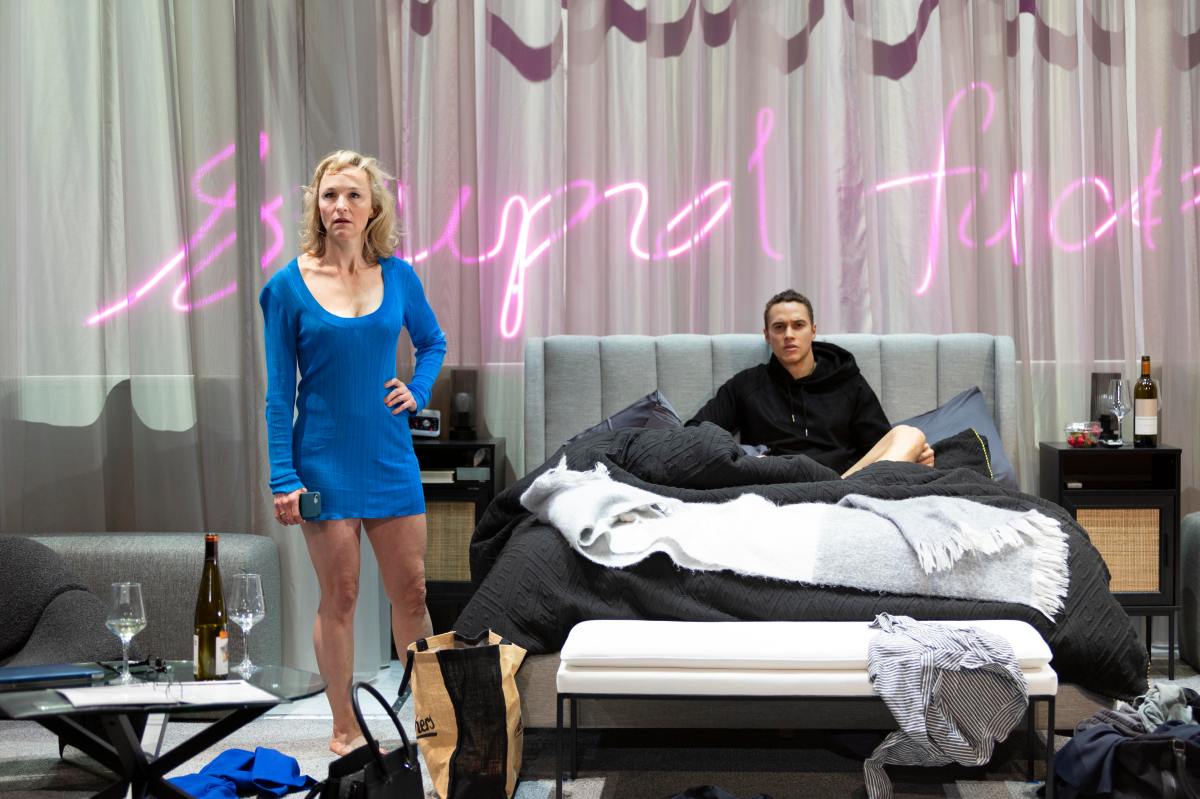Are women human? The legal scholar Catherine McKinnon posed the question, not entirely unseriously, in a 2006 book about the limitations of international law. But, as ever, literature overleapt law: fiction had been asking if women were human since Medea, since Lady Macbeth, and yes, since Anna Karenina.
Given the resonances of the age-old question, it’s no surprise that playwright Suzi Miller, fresh from the West End success of her play Prima Facie, has chosen the frame of the 19th-century novel to map the contours of her play about ambition and passion, romance and family, love, work, and a woman’s voice.
Tolstoy famously thought the domestic life was the only one worth living for his characters. His own wife’s infamous unhappiness only undermined this claim. Perhaps for this reason, Miller has argued her play is a ‘feminist interrogation’ of Anna Karenina, not an adaptation.
So how do you interrogate a classic? Firstly, by grounding it in the present. Miller ditches the domestic scene for a hotel setting, and moves the centre of the scandal from balls and country houses to a hotel room rimmed with endless traffic of Twitter abuse. The play’s protagonist is the subject of backlash both in her job performance and her domestic identity: she had an affair with a younger SAS whistleblower, the subject of an interview for her show.
The play feels freshest when it references this scandal with self-awareness. It’s easy to imagine Callan Colley’s Lexi as an honourable young conservative misguided by the codes of masculinity, perhaps in the mould of Andrew Hastie testifying against Ben Roberts-Smith.
The locus of the drama is focused on the back and forth between Colley’s naivete and Caroline Craig’s seasoned journalist. Both act convincingly, but the script is overburdened by a reliance on indignation that overburdens the see-sawing narrative from its rightful flight, and creates a sameness about the enduring tension that undermines the plot twists.
But the skills of pacing, counterpoint, and modulation take years to develop, and the incubation of genuinely arresting plays is often not consistent with the commercial imperative to create an Australian smash hit off the back of an international one. In fact, Miller’s mentor is the American playwright Edward Albee, and the same problem can be traced back to bad productions of his play Who’s Afraid of Virginia Woolf?
Read: Book review: Nimblefoot, Robert Drewe
Miller, a former lawyer, is reputedly friends with Annabel Crabbe and Leigh Sales, and the backlash around the play echoes Sales’ candid interviews about attacks on her professionalism by critics of 7.30. Both Anna Karenina and Anna K share the dramatic premise that the dramas they engender are not really scandals as much as assaults on a conservative sensibility that demands a woman be a Victorian angel in the house, and situates her in a environment that takes revenge on the way she exercises her judgment in her job.
Therefore, Carrisa Licciardello’s direction shines most in the details. A beautiful set design by Anna Cordingley and Paul Jackson capture the Malthouse’s unique contemporary sensibility and highlights the message of the play. Louisa Mignon’s supporting characters have the pathos and colour of their Tolstoy predecessors. And it’s worth noting given the recent controversy over intimacy co-ordination that this play features an intimacy choreographer: Cessalee Stovall.
This is a crowd-pleasing meditation on the humanity of women in an age where misogyny takes on a technological dimension, with the style and confidence that make the Malthouse one of Melbourne’s flagship homes of drama.
Anna K by Suzi Miller
Director: Carissa Licciardello
Set and Costume Designer: Anna Cordingley
Lighting Designer: Paul Jackson
Sound Designer and Composer: Joe Paradise Lui
Voice Artists: Brigid Gallacher and Jing-Xuan Chan
Stage Manager: Lyndie Li Wan Po
Assistant Stage Manager: Cointha Walkeden
Cast: Caroline Craig, Callan Colley, Louisa Mignone
Tickets: $20-$79
Anna K will be performed until 4 September 2022.





